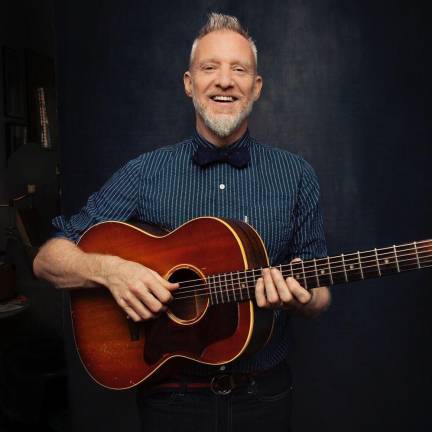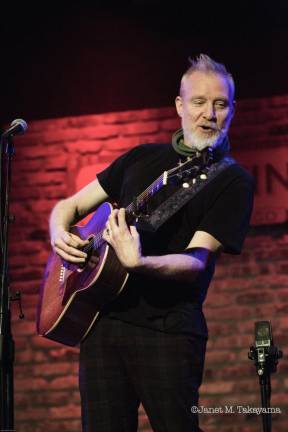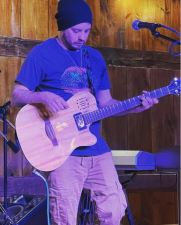Talking to Chris Barron
SPARTA. The Spin Doctors frontman will perform Feb. 22 at Krogh’s.


Stefani M.C. Janelli interviews Spin Doctors frontman, Chris Barron, who will perform Thursday, Feb. 22 at Krogh’s Restaurant & Brew Pub in Sparta.
Question: What brings you to Sparta? Is this your first time in the area or have you visited before?
Answer: I’ll be playing at Krogh’s! You know, I don’t think I’ve been Sparta. I grew up in Princeton. I went to middle school and high school in Princeton. So, you know, I’m familiar with the Central Jersey area. But I don’t think I’ve ever been to Sparta. Krogh’s looks like a like an awesome little joint. Killer beer. I love beer.
Q: You’ve been the lead singer of the very popular band Spin Doctors since the ‘80s, but you’ve also embarked on your own solo journey. What was the purpose behind starting the solo project?
A: Well, honestly, I started out playing solo acoustic, and I’ve been playing the guitar since I was 8. But I didn’t get serious about it until I was 12 probably. And a lot people don’t know, I’m a pretty accomplished guitar player.
And over the years, I’ve always done solo acoustic shows. But I’ve never made a really concerted effort to do a bunch of shows consistently until last year. And, you know, the Spin Doctors are still together. We’re doing like 50 shows over the course of the summer. And in the winter, it’s kind of slower.
I have always been really fascinated by guys like Bob Dylan and Reverend Gary Davis and Robert Johnson who are just a person and an acoustic guitar. I just always thought that was such a cool way to get a song across. And that’s how I started out. So, you know, I just decided last year that I wanted to kind of consistently get out there. Do that because it takes me back.
Q: How do you feel your solo music differs from the music of the Spin Doctors?
A: Well, first of all, of course, it’s acoustic and when I play live, it’s just me and a guitar. That has this like intrinsic kind of sound and feeling - it’s you know, it’s not as loud.
I’m a pretty accomplished guitar player. And I play with quite a different style than Eric Shankman. But I think Eric is one of the best guitar players in the world. And I’ve been looking over his shoulder for 30 years now.
I’m really good at weaseling guitar lessons out of people and I’ve never been able to weasel a guitar lesson out of him. But I have been watching his hands for all these years and listening to his tone, and he’s just got this monster, monster tone. He just makes a beautiful sound on the instrument. And I really think I play guitar kind of beautifully. And people are always surprised. People don’t know that I can play that, people are surprised by that.
I wrote “Two Princes,” the song I’m most famous for, when I was 19. And so I’ve been writing songs ever since. So I think I’m also a pretty accomplished songwriter. And I think people are struck by, you know, I still have that really hooky kind of style of songwriting, but it’s also very quirky and kind of poetic, and people are like, wow, I didn’t know you could write like this.
And also, when I’m singing with the Spin Doctors, it’s loud like, you know, Led Zeppelin. So I’m channeling kind of like a combination of like James Brown and Robert Plant and Roger Daltrey, saying sort of flat out. With the solo shows, I’m able to kind of tap into a more emotional, more lilting, kind of subtle style of singing, and I think people don’t know that I can sing that way.
If you like acoustic music, I think I’m out there doing something pretty original that’s tied into a lot of great traditions. My guitar teacher was Woody Mann, who unfortunately passed away of cancer during COVID.
So I learned a bunch of kind of cool, traditional ragtime blues, gospel fingerpicking from him. He was taught by Gary Davis, who was born in like 1894. So I have a lineage of teachers and stuff that goes back to some pretty seminal people. I just think that you can see when it’s just one person, just a person and a guitar, I don’t know, I think it’s like a really beautiful thing. It’s very, very vulnerable. And yet powerful.
Q: What is your favorite part of your solo project?
A: That’s such a good question. Playing with the Spin Doctors is with this loud, powerful, kind of awesome band. I think those three guys are three of the best musicians of the era. Honest to God, like they all do incredible gigs on the side. They’re all really, really accomplished, really fantastic, broad musicians.
So I love playing with them and they’re like three of the most important people in the world to me. We’re really close friends. And doing that really gets me psyched to just go out on my own and just play songs on a guitar alone. And then going out and playing songs alone on a guitar gets me psyched to go back and play with the (band). The two things are so different.
I love how different it is. I don’t play guitar on stage all summer long. And then in the winter, I get to play guitar. I like the singing because it’s a really different kind of singing. I don’t have to sing over anything loud. And I love the fact that there’s no other musicians on stage so I can seriously f--- around. Slow down, speed up, stop, you know, do a section over again. There’s nobody I can mess up like a band. Nobody has to follow me.
Q: You’ve maintained a successful career in the music industry for more than 30 years. What is one piece of advice you would give about longevity in the ever-evolving music industry?
A: I would say pursuing music seriously. I think the best thing to do is like not take yourself seriously. But take what you do seriously. So you take the music seriously. And, you know, you can be a sincere person and an earnest person, but you don’t have to be a serious person. But I think taking music itself really seriously and pursuing it is its own reward.
If you really go after, take lessons, learn the things you want to learn in a thorough kind of way ... like I’m learning a song right now called “Blues Run the Game,” and it’s this traditional, post-folk song from like 1965 by a guy named Jackson C. Frank. It’s part of the canon. All these guys in England were playing this tune, and even the Black Crowes do a version of it and I’m learning this fingerpicking thing. I’m sitting there, playing it one note at a time, the same way I did when I was 10.
Figuring something out, and if you’re willing to break things down and play them really slowly, you can learn anything as long as you’re willing to humble yourself. If you know that Mozart had to do that, all the people that you admire at one point had to do that and had the humility to go back and do that later on if they wanted to learn something new, they all had to do that.
So you’d be sitting there and your brain starts chattering and going like, ‘I should have been working on this 10 years ago’ or ‘I suck, I should be able to learn this faster. I should be able to do this better. What the hell is wrong with me?’ But if you push through that, you end up in this kind of meditative state. And all that falls away after like five or 10 or 15 minutes and you’re just sitting there learning something. And that is so good for your soul. And your brain is proven to help you not have dementia later on in life.
If you come at this whole thing, like music is its own reward, then success becomes just like an aesthetic consideration rather than this external thing, where you’re like, ‘Oh, I haven’t made enough money’ or ‘Oh, I haven’t gotten enough applause’ or ‘Oh, I haven’t, you know, done this or that or the other thing’ that’s all outside of your control.
Where you can control is playing and singing and writing beautifully. There are plenty of people who have been incredible artists who maybe haven’t had that external kind of success but they are super-accomplished. But your chances of having that external success go up a lot if you do all those things. But if it doesn’t work out, you have the satisfaction of knowing that you’re f------ awesome.
Q: Your last solo record was released back in 2017, with a single released in 2022. Can we anticipate any new music from Chris Barron?
A: Yes! The Spin Doctors have a new record that’s coming out in September of this year. It’s called “Gorilla.” It’s an extremely entertaining album with some serious ear candy. It’s a real throwback.
I think it’s the best record we’ve made since our first record. It’s a real throwback to the original Spin Doctors approach with a bunch of really hooky songs. But also some deeper stranger material with like odd time signatures and some like dissonant harmonies. But also stuff that’s just immediately accessible and like super fun. It’s a really, really fun album.
We had a ball recording it. We recorded it at Jack Daly’s studio, our bass player’s studio. We were all staying in this really nice hotel together and coming down to the lobby in our pajamas and drinking coffee. Just being like, ‘Oh my goodness, this is so fun!’
And I’m working on a solo record right now that I think I’m gonna put out next year. It doesn’t have a title yet. But it’s also kind of a fun, kooky, quirky record that I’m recording with my friend Blake Morgan, who is really fantastic musician and an amazing engineer and producer. And that’s a predominantly acoustic record, and I’ll be playing songs from that record at Krogh’s.
Q: You’ve performed on some of the biggest stages with the Spin Doctors. What do you enjoy about playing intimate stripped-down sets like the upcoming show at Krogh’s?
A: You know, smaller audiences are really intense because you can kind of like see the whites of their eyes. Gigs are just intense, performing in front of people is intense.
When you’re playing in front of a gigantic audience, it’s intense because the audience is gigantic. But there’s less of a kind of personal feeling. The vulnerability comes from standing in front of a huge amount of people. This sort of natural, phenomenal intimidation that a gigantic group of people, you know, in contrast to you being an individual kind of creates.
When you’re playing in front of a small audience of like 50 or 100 or 150 people, that like crowd, mob intensity, diminishes and what increases is the intimacy and the fact that there’s just people right in front of you. You can see the faces of the people in the back row and the people in the front row are like just a few feet away from you. And everybody is listening in a much more kind of microscopic, rapt kind of way.
And, of course, it’s just me and a guitar. So if I make a mistake or whatever, there’s nothing to hide behind, like there is with a band. If you make a mistake, you can kind of duck behind the loudness, whereas if it’s you and a guitar, if you make a mistake, there’s nobody else on stage who could have possibly. So there’s a kind of intensity to that. And I think both things create an energy that audiences can feel - it’s like perfectly palpable. Whatever is going on with you is pretty transparent for the audience for sure.
Q: What songs can we expect from you at Krogh’s? Strictly solo stuff or will we be treated to any Spin Doctors classics?
A: Absolutely! I always play “Two Princes” and “Little Miss Can’t Be Wrong” and “Jimmy Olsen’s Blues.” I always put in a few Spin Doctors deep cuts, you know, because I’m not a dick. I know that people come to hear those songs, and I like playing those songs.
I don’t understand when artists are like ‘Oh, I hate playing my hits.’ People ask me, ‘Do you get tired of playing the hits?’ Like ‘Do I get tired of people going crazy and being really happy when I play a song that I wrote?!’
I never get tired of that. I like those songs. I think they’re good songs. I’m glad that the songs I’m most famous for are fun songs to play. I mean, I’m heavily aware that the reason I get to do this is because people come and buy tickets to hear me do it.
There’s a certain amount that you have to do it for yourself so that you can have the courage to create stuff that resonates with you. The funny thing about that is when you dig deep down into your own self and write things for yourself that are true to you, then they kind of like strike off of a universal truth and create a kind of a truth and a spark that rings true for the listener.
So to be able to break free from the audience and write for yourself and sing for yourself and play for yourself but at the same time you got to entertain the people that show up. And that’s your job, to kind of strike a balance between those two things. I am equally enthusiastically doing my own crazy, weird, kooky thing and entertaining myself. And at the same time absolutely out there playing stuff that I think people are going to like. Clearly people are hoping that I’m going to play these hit songs. I just don’t believe that it’s at all cool not to do that.
